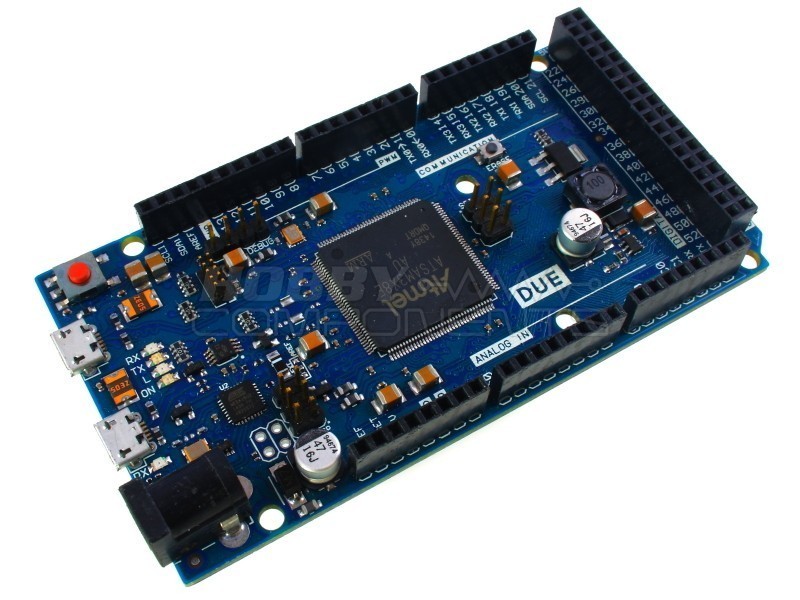Open Smart Uno R3...
The Open Smart One R3 is an Arduino Uno (R3) compatible development board. It uses the same...
- On sale!




The Arduino Due is a microcontroller board based on the Atmel SAM3X8E ARM Cortex-M3 CPU (datasheet). It is the first Arduino board based on a 32-bit ARM core microcontroller. It has 54 digital input/output pins (of which 12 can be used as PWM outputs), 12 analogue inputs, 4 UARTs (hardware serial ports), a 84 MHz clock, an USB OTG capable connection, 2 DAC (digital to analogue), 2 TWI, a power...
The Arduino Due is a microcontroller board based on the Atmel SAM3X8E ARM Cortex-M3 CPU (datasheet). It is the first Arduino board based on a 32-bit ARM core microcontroller. It has 54 digital input/output pins (of which 12 can be used as PWM outputs), 12 analogue inputs, 4 UARTs (hardware serial ports), a 84 MHz clock, an USB OTG capable connection, 2 DAC (digital to analogue), 2 TWI, a power jack, an SPI header, a JTAG header, a reset button and an erase button.
The board contains everything needed to support the microcontroller; simply connect it to a computer with a micro-USB cable or power it with an AC-to-DC adapter or battery to get started. The Due is compatible with all Arduino shields that work at 3.3V and are compliant with the 1.0 Arduino pinout.
The Due follows the 1.0 pinout:
• TWI: SDA and SCL pins that are near to the AREF pin.
• The IOREF pin which allows an attached shield with the proper configuration to adapt to the voltage provided by the board. This enables shield compatibility with a 3.3V board like the Due and AVR-based boards which operate at 5V.
• An unconnected pin, reserved for future use.
Warning: Improper use of this development board can result in damage to both the board and anything connected to it. Unlike other Arduino boards, the Arduino Due board runs at 3.3V. The maximum voltage that the I/O pins can tolerate is 3.3V. Providing higher voltages, like 5V to an I/O pin could damage the board. We test all Arduino Due's before dispatch and cannot accept any responsibility for damage caused by improper use or failure to follow the comments above. If you are unsure about connecting a particular shield/module to this board, please contact us for advice at: sales@hobbycomponents.com
Further information, including schematic, EAGLE files and pinout is available on our support forum here.
The Open Smart One R3 is an Arduino Uno (R3) compatible development board. It uses the same...
This is our lower cost alternative to the standard R3 Uno, but in this case lower cost doesn't...
Our very own version of the popular Arduino Mega development board (HCARDU0092). It hast been...
The Arduino Pro Mini is a microcontroller board based on the ATmega328. It...
The Arduino Leonardo is a microcontroller board based on the ATmega32u4. It has 20 digital...
The Pro Micro is similar to the Pro Mini, except for the fact that it utilises the ATMega32U4....
This Arduino Uno compatible development board is the ideal option for anyone who just wants to...
This Arduino compatible board is specifically designed to drive a 3 colour RGB LED dot matrix...